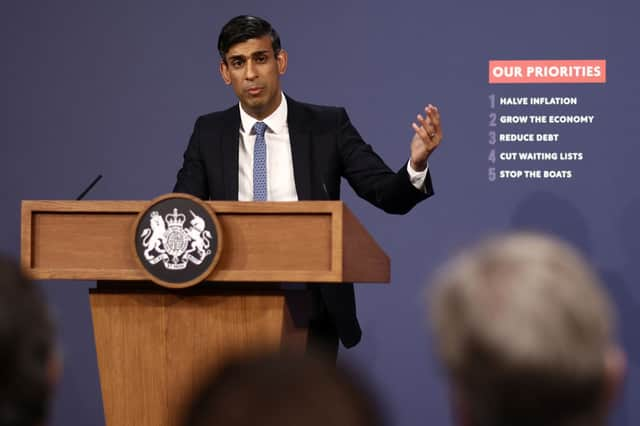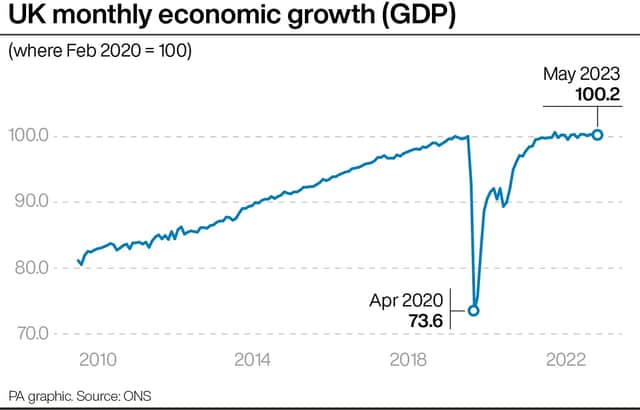Fact check: is Rishi Sunak fulfilling his 'five promises' on inflation, the economy, migration and the NHS?
and live on Freeview channel 276
On 5 January, Rishi Sunak announced five "promises" which he said he wanted the electorate to judge him on.
These included halving inflation, cutting NHS waiting lists, and passing legislation which would "stop the boats" - which Sunak said would be achieved by the end of 2023. The Prime Minister frequently mentions these pledges in speeches and interviews, referring to them as the "people's priorities".
Advertisement
Hide AdAdvertisement
Hide AdAt the time, he faced some criticism for not being bold enough - with economists saying in January that inflation halving and the economy growing were highly likely. But despite Chancellor Jeremy Hunt recently announcing that Sunak may unveil another five promises (I know how lucky are we, the voters, to get 10 promises from the PM), at just over half way through the year, the Prime Minister is struggling with all five of his "people's priorities".
Inflation is proving more stubborn to bring down than many economists thought and NHS waiting times have just hit record levels (again). So, NationalWorld assesses what progress the Prime Minister is making against his five promises as the next general election continues to draw closer.


1. Halve inflation
Rishi Sunak's headline promise in January was to halve inflation, which was at 10.7% when he made the commitment. At the time, economists and the Bank of England were predicting that inflation would drop much lower than the 5.35% that appears to be needed for the PM's promise to come true. (When quizzed by journalists the other day, Sunak refused to put a figure on his target).
However, this has not happened - and inflation in May 2023, according to the CPI, was 8.7%. Now, this could drop down to 5.35% over the next six months, but worryingly for Sunak, core inflation is now at a 31-year high. This is the rate of price hikes across the UK economy for all the goods and services we consume regularly, with the exception of energy, food, alcohol and tobacco.
Loading....
Advertisement
Hide AdAdvertisement
Hide AdThe ONS says it is used to “assess the underlying inflationary pressures in the economy” whereas headline CPI can “be driven by temporary supply shocks, or other effects that do not have a lasting impact”. So this gives a better indication of how embedded inflation is in the economy - and worryingly for Sunak, core inflation is heading in the wrong direction.
The Bank of England is clearly concerned about inflation, as interest rates have been hiked for the 13th time in a row. Besides the embarrassment of failing on a promise Sunak has defined his term on, inflation is the issue which most worries Conservative MPs ahead of the next election - as higher interest rates is causing huge problems for mortgage holders.
With core inflation at its highest level since 1992, it's looking very difficult for Rishi Sunak to get inflation down to 5.35% by the end of the year. He'll be hoping for better news on Wednesday when the latest CPI figures come out.
2. Grow the economy
Sunak said he wanted to grow the economy to get more people into work. In the speech on 5 January the PM lamented the fact that one quarter of the UK’s workforce was “inactive” and promised to encourage more people back into jobs. He said this was important to him as jobs help people find “purpose, confidence and dignity”, as well as offering the chance to “build a better life.”
Downing Street has said the pledge will be met if the economy (measured as gross domestic product) grows from the third quarter (July to September) to the fourth quarter (October to December). This means GDP only needs to grow at one point this year for Sunak to "fulfil" his promise, and currently the economy is not growing.


Advertisement
Hide AdAdvertisement
Hide AdIt contracted by 0.1% in May - with economists putting the blame at the extra bank holiday for the King's coronation. That also meant the economy has declined by 0.1% compared with January, according to the ONS.
Ironically, the economy contracting now could actually help Rishi Sunak fulfil his promise. The issue will be - if GDP hardly grows - whether the electorate feel richer or poorer come the next election, and many people are feeling the cost of living pinch.
Given the very flimsy conditions Sunak has set himself for "growing" the economy - i.e. only between the third and fourth quarter - it is possible that he could still fulfil this promise, despite the economy actually getting smaller over the course of the year. Whether people feel like the economy is growing, when GDP has stagnated and contracted at different points so far in 2023 is a different matter, and, along with inflation, this makes grim reading for the PM ahead of the next election.
3. Ensuring national debt is falling
After Liz Truss and Kwasi Kwarteng’s notoriously disastrous mini budget, the UK’s national debt soared. This resulted in Jeremy Hunt’s “tough decisions” Autumn Statement last year, in which he raised taxes to reassure the financial markets. Sunak made the promise in January to bring down national debt - which usually means as a proportion of GDP.
Sunak hasn't given a time period for this pledge, which is good as debt is above 100% of GDP for the first time since the 60s and has been getting higher. And as the economy is struggling to grow, it makes reducing debt even harder.
Advertisement
Hide AdAdvertisement
Hide AdSunak and Hunt said they wouldn't borrow to fund the latest round of public sector pay rises - and to ensure debt begins to fall they will either have to tighten the purse strings further or hope the economy grows much faster than it has been.
Despite government debt currently rising, given Sunak hasn't put a time period on this promise, it's possible that debt will fall before the next election - which will be held in the next 18 months. The PM appeared to make these promises as he wants to be seen as responsible and trustworthy, however if he refuses to acknowledge them, the whole premise could backfire.
4. Cutting NHS waiting lists
Rishi Sunak promised to cut NHS waiting lists (in England only as health is devolved to Wales, Scotland, and Northern Ireland) so that patients could get care faster. He said: "NHS waiting lists will fall and people will get the care they need more quickly." Sunak promised the government was taking “urgent action” by providing 7,000 more hospital beds and increasing funding to social care so more people can be discharged from hospitals.
That action does not appear to have filtered down yet, as on Thursday it was announced that NHS waiting lists in England had hit record levels again. Figures showed that 7.47 million people were waiting to start routine hospital treatment at the end of May, up from 7.42 million at the end of April. It is the highest number since records began in August 2007.
Sunak will have to get the waiting list below 7.2 million, the number of people waiting in December 2022, if he wants it to fall from when he made that promise. And while experts say it's quite hard to predict due to seasonal fluctuations, the PM already has an uphill task with junior doctors currently on strike and further industrial action planned from consultants and radiographers.
Advertisement
Hide AdAdvertisement
Hide AdDr Sarah Scobie, the Nuffield Trust's acting director of research, told NationalWorld: "In order to get the waiting list down, we don't just need to increase activity to meet the demand which would have been there anyway, we also need to meet the demand that has built up since the pandemic and because of the pressure on the NHS. We need to do even more than that to ensure it will go down.
"It's not showing any signs of plateauing or going down, but it is really difficult to predict. It's worth noting that the median wait - how long people are waiting on average - has also been steadily going up, so half of patients are waiting more than 14 weeks.
"So there's this building up of people that have got longer and longer waits, which is another factor that makes it more difficult for hospitals to get their total waiting list down. They're needing to balance patients who have been waiting a long time, with perhaps treating people that they could treat quickly to reduce the overall waiting list."
To comply with his promise as we understand it, Sunak would have to get the waiting list below 7.2 million by the end of the year. It is currently on 4.7 million, and according to Dr Scobie is showing no signs of "of plateauing or going down". And worryingly for the PM, the median waiting time is going up which makes it harder for hospitals to get waits down. Even though experts say it can be hard to predict, given the NHS's current predicament, with strikes still going on, it is looking unlikely he will keep this promise.
5. Passing new laws to stop small boats
Immigration has been a key focus of the Prime Minister’s since he took office in October, and he said one of his promises is to "stop the boats". Sunak said he would do this by passing "new laws" which would see those arriving in the UK "illegally" detained and removed. With this being the actual wording Sunak used in his speech, this is the vaguest of all five of his promises.
Advertisement
Hide AdAdvertisement
Hide AdTherefore, despite significant rebellions, if the PM and Suella Braverman manage to pass their controversial new Illegal Migration Bill, they will probably argue they have succeeded with this promise. The draft law, which was announced in March, would give the Home Secretary sweeping new powers to immediately detain asylum seekers without bail or judicial review, before removing them from the UK - either by returning them to their country of origin or deporting them to a “third country” such as Rwanda. Refugees and migrants would also then be banned from ever returning to the UK and blocked from seeking citizenship.
However, even if this law is passed, it appears that the main focus - the Rwanda policy - may be illegal, as the scheme was ruled unlawful by the High Court. On 29 June, judges overturned a previous High Court ruling that said the nation in east Africa could be considered a “safe third country”. The government are now seeking to appeal this in the Supreme Court.
Nevertheless, if there are fewer small boat crossings this year than in 2022 (which could be possible if you look at the chart below), Sunak will argue he has made good on his promise, even without the Rwanda policy.
What do you make of Rishi Sunak's five promises? Email our Politics Editor with your thoughts at [email protected].
Comment Guidelines
National World encourages reader discussion on our stories. User feedback, insights and back-and-forth exchanges add a rich layer of context to reporting. Please review our Community Guidelines before commenting.
